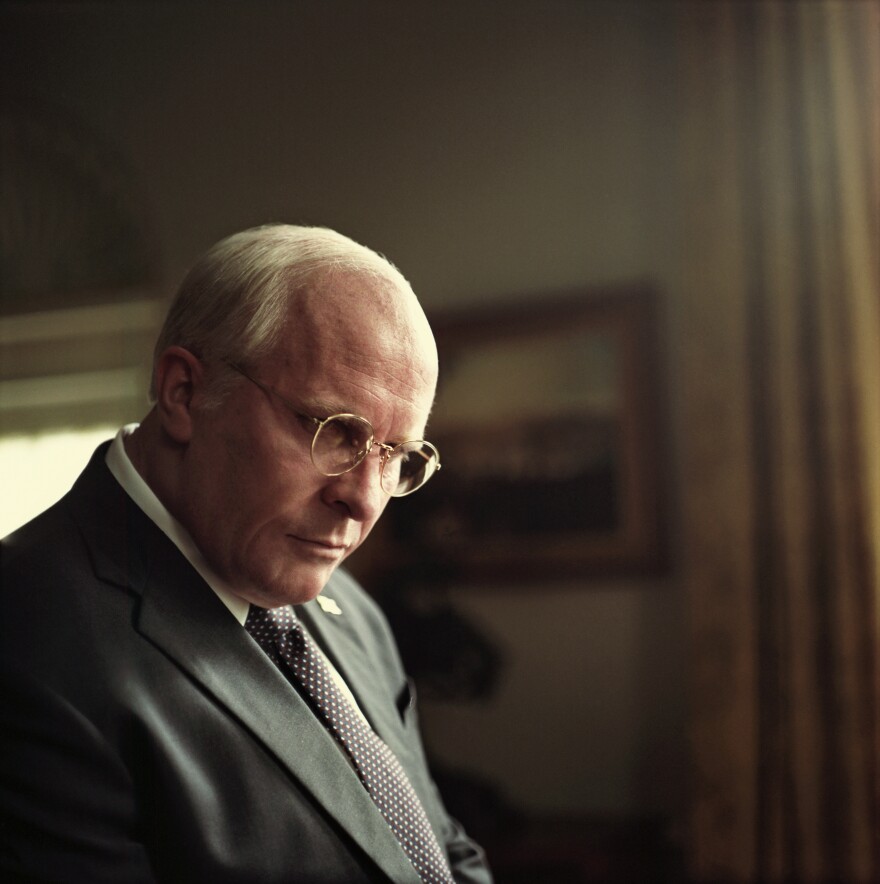Adam McKay, the writer and director of Vice, has collaborated with Will Ferrell on Anchorman, Talladega Nights and The Other Guys, so you figure that he’s got a fair amount of funny cynicism in him. But maybe not so much cynicism as McKay shows in Vice, a story about the former vice president to George W. Bush, Dick Chaney. McKay also has a goodly amount of contempt in him, for a man he clearly finds quite contemptible, with one very deeply felt exception.
Vice opens on Chaney (Christian Bale) as a young man drinking and carousing his way to an early exit from Yale. He’s a slob and a wastrel, and a cruel young man, until his wife Lynne (Amy Adams) lays into her hung over husband one morning and tells him bluntly that she is not about to become a mom with 10 children living in a trailer with a no-account husband. And from there, Dick Chaney begins his rise to power in America.
He starts with no apparent political ideas or ideology, but because he likes Donald Rumsfeld’s callous scorn, he decides to become a Republican, which leads to Congress and his tenure as Secretary of Defense and then to the office of the vice president. The movie uses Chaney’s recurring heart troubles – and his heart transplant—to underline its picture of a heartless man.
Adam McKay has made a sarcastic movie with plenty of nerve, and he doesn’t alert you to his departures from literal actuality. A bedroom conversation between the Chaney’s sounds out of whack until you realize that they’ve imperceptibly eased into a scene from Macbeth about how to grab power. The Chaney’s are just as nasty as the Macbeths, but Dick Chaney gave up early on the idea of becoming king – or president of the United States. Instead, he went for power less noticed.
Chaney likes to fly fish. The Secret Service code name for him was Angler, and Adam McKay expands the meaning of angler from someone fishing to someone always angling for something. George W. Bush (Sam Rockwell) wants to talk to Chaney about becoming his running mate, but Chaney plays cagey and elusive. As they talk, Chaney the fisherman skips a fly across the water. He’s leading Bush along; the fly looks enticing. It floats; Chaney evades; Bush takes the bait. He grants Chaney power over international affairs and more – and Bush leans over the table, a fly hooked to his mouth.
This George Bush is a buffoon, and Chaney just leads him on while Bush never figures it out. As the tricky narrator of Vice says, when 9-11 came, others saw it as a tragedy, but Chaney saw opportunity. The result for America is a war in Iraq, the horrific torture program, and a giant step toward Chaney’s goal of a unitary presidency, meaning unbridled presidential power.
The Bush-Chaney duet comes off with two terrific performances from Christian Bale and Sam Rockwell. The two simply absorb themselves into their parts – Bush as an exuberant idiot and Chaney as an ultimate manipulator, observant and quiet until he sees his moment to strike. It’s funny in its way, and a devastating portrait of malevolence.
But there is that spark of remarkable love and decency. Chaney’s daughter Mary is gay and married to a woman. Chaney supports her and has never spoken against gay marriage, even though it’s major Republican issue. When the other daughter, Liz, rejects Mary and attacks gay marriage to win an election, the hurt in this devoted father’s eyes is profound.
But Vice does not go soft on Dick Chaney. It’s a full-out attack on the man, his character and his politics. I’ve watched the movie twice this week. The second time through it seemed less raucous, less like it was having a good time with all this malice. The film seemed more consistently serious and angry, and the overall tone less lighthearted. Not glum, but not so joyfully disparaging.





